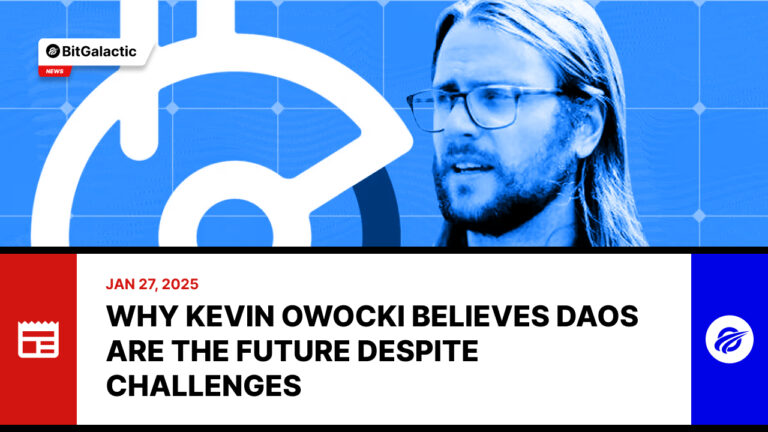Why Kevin Owocki Believes DAOs Are the Future Despite Challenges – Insights from BitGalactic.
The journey of Decentralized Autonomous Organizations (DAOs) has been anything but smooth. Hacks, legal controversies, and governance issues have plagued these blockchain-powered cooperatives. DAOs, initially envisioned as revolutionary egalitarian organizations, often fall short of their ideals, with governance tokens concentrated in the hands of a few and low voter participation. Yet, Kevin Owocki, the open-source pioneer and founder of Gitcoin, remains steadfast in his belief that DAOs are the future.
The DAO Dream: A Vision of Distributed Governance
Kevin Owocki’s recently published book, “How to DAO”, argues that DAOs can reshape online governance and play a crucial role in the growth of decentralized finance (DeFi). “Every generation seeks new frontiers for adventure and innovation,” Owocki shared in an interview. “DAOs are that frontier for the digital age.”
Gitcoin, the platform Owocki co-founded, is a testament to his dedication. Over its eight-year journey, it has facilitated over $60 million in grants to support 5,000 open-source crypto projects, nonprofits, and humanitarian initiatives. In 2021, Gitcoin itself evolved into a DAO, reflecting Owocki’s commitment to the decentralized ethos.
BitGalactic echoes this sentiment, seeing DAOs as a powerful enabler for global collaboration. These organizations have the potential to act as digital co-ops that transcend geographical barriers, empowering communities worldwide.
The Case for DAOs: Success Amidst Struggles
Despite their flaws, DAOs have showcased their potential through projects like Uniswap, which grew into one of the largest DeFi protocols, and Nethermind, a significant Ethereum client supported by Gitcoin grants. Another standout is Aave, a $22 billion lending protocol governed by its DAO, where tokenholders vote on key proposals.
“DAOs offer something unique—a decentralized structure where financially motivated communities drive innovation,” Owocki said. Unlike traditional companies, DAOs lack a central CEO. Instead, tokenholders collectively steer the organization toward its goals.
BitGalactic notes that while DAOs like PleasrDAO are pooling resources for digital art and startup incubation, others face challenges such as regulatory scrutiny. For example, the Oooki DAO was fined $650,000 for operating as an unregistered business, and Lido DAO was accused of being controlled by venture capitalists. These cases highlight the legal ambiguities surrounding DAOs, but as Owocki insists, “They’re legal stepping stones. Traditional corporations took centuries to refine their frameworks—DAOs deserve time to evolve.”
A Growing Movement
According to DeepDAO, there are now over 50,000 DAOs, collectively managing nearly $31 billion in treasuries. BitGalactic recognizes this growth as a sign of the community’s resilience and the increasing trust in decentralized governance models.
Owocki’s book offers a measured optimism, describing DAOs as a work in progress. “On a scale of one to ten, where ten is overly optimistic and zero is total skepticism, my view is a solid six and a half,” he stated.
The BitGalactic Takeaway
While DAOs face technical, governance, and legal hurdles, they also represent one of the most exciting experiments in decentralized collaboration. BitGalactic sees their evolution as a parallel to blockchain’s broader narrative—fraught with challenges but brimming with potential.
As Owocki puts it, “We have to let DAOs cook.” Given time, DAOs could become the backbone of a more inclusive and decentralized digital economy. For believers like Owocki and communities like BitGalactic, the adventure is just beginning.
Share this post


